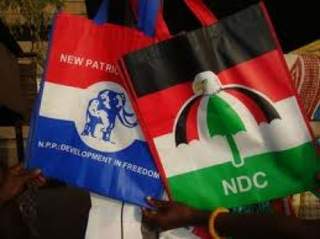Pharmacist Kwame Sarpong Asiedu says Ghana’s healthcare system has been rendered a circus on the altar of political expediency.
Speaking at a lecture delivered at the British Council Hall on the theme "Down Memory Lane: From 1993 to the Present," where the focus was on Ghana's democracy and its consequential impact on public health, he stated that when it comes to the health sector, the country’s politicians are in a race to the bottom.
According to him, the political class being very well aware that investments in the health sector take years to trickle down as health outcomes, have resorted to profligate spending on the sector not caring whether or not said investment is value-for-money and can produce the required health outcome in the future.
“For example, achieving significant improvements in infant mortality rates may take between five to 10 years, for life expectancy, it can take around 10 to 20 years and for maternal mortality rates, it may take around 10 to 15 years.
"Therefore, they are clear that they cannot claim credit for most of these outcomes over a four or even eight-year term.
“However, if they build a hospital, CHIPS compound or paid trainee nursing allowances they could point at these at the next election whether or not they are value-for-money investments or misplaced priorities.
"Being the storytellers they are they opt for the tangibles and carve their stories around them. Hence slogans like “Agenda 111” have become catchphrases on which votes are procured,” he said.
Kwame Asiedu was quick to partly blame Ghanaians for this phenomenon as well.
According to him, as citizens, we have become so politically polarized and short-sighted that we are failing to hold the powers that be accountable.
“Is it not strange that in a country whose constitution speaks of the directive principles of state policy, we find a government commencing the building of new health facilities when previous facilities started by the previous government remain uncompleted?
“How have we as citizens become so divided and supine that we fail to stand up when things like this happen knowing very well that the main driver of such schemes is procurement and sometimes sleaze?
“This is a major contributor to the waste we see in our health infrastructural projects and perhaps a major contributor to why our health inputs yield marginal outcomes,” he said.
He had earlier stated that Ghana’s health outcome indicators in comparison to other countries with similar gross domestic products like Rwanda, Liberia and Sudan are abysmal despite the large investments being made into the country’s health sector in comparison to the other economies.
He said while currently, politicians tend to compare their performance in the sector to that of their political opponents, comparing the same indicators to neighbouring countries would show the country’s race to the bottom.
“So whilst they keep themselves busy shouting themselves hoarse as we look on, we slide down the global rankings of most health indicators whilst countries like Rwanda rise rapidly. They behave as though we are in a race to the bottom,” he said.
He however averred that there have been some overall improvements in the health sector in the last three decades.
“I also acknowledge that activities such as Ghana’s extended program on immunisation, the eradication of guinea worm in the country and the gains made under the Sasakawa Global 2000 initiative,” and the introduction of the national health insurance scheme which though he described as an “excellent health opportunity” to improve access to affordable healthcare has since failed to deliver the expected health outcomes.
He thus continued, “It is disingenuous therefore for politicians to speak to absolute numbers and not the comparative trends. The former approach which is their preference is the hallmark of mediocrity.
"Unfortunately, our gullibility as citizens prevents us from reading between the lines and challenging this approach. Sometimes we even take sides as gladiators in the theatre defending the very things that affect our quality of life negatively. Who did this to us?
“I remember that a former President told us that Ghanaians have short memories. Then the one who criticised him for making that statement took over under the slogan, “We have the men.” Seriously? Does the data as presented tell us that the supposed men have behaved like knights in shining armour?
“I do not believe that if the framers of our Constitution were asked today, they would be proud of the circus our health system has become on the altar of political expediency. I reject any assertion that they would accept that these are the best dividends our health system can provide in a democracy,” he said.
Latest Stories
-
Tesla’s first-quarter deliveries slump on Musk backlash, weak demand
3 minutes -
‘It is finished’- Finance Minister reacts as Mahama approves abolishing of e-levy and others
8 minutes -
Prosecution amends charges against Ahmed Suale murder suspect
20 minutes -
‘Sit With TrendyRail’ launched to inspire young creatives
26 minutes -
Iva Foreva advocates for end to mental health stigmatisation
31 minutes -
Lighthearted: Please-ing isn’t pleasing
31 minutes -
Stonebwoy’s management demands apology from DJ Lord over Accravaganza allegations
39 minutes -
Ade Coker dares Ntim Fordjour over alleged drug trafficking flight claims
44 minutes -
EBQ writes: London’s “still water”, Ghana’s muddy rivers
48 minutes -
Napo supports Adum PZ fire victims with GH₵50,000 and 500 bags of cement
51 minutes -
Kevin Taylor blown away by Trey La’s ‘Kevin Ekow Taylor’ EP
57 minutes -
Ghana Maritime Authority hints at layoffs due to over-staffing
58 minutes -
Bond market: Activities pick up by 10.22% to GH¢999m
59 minutes -
OmniBSIC Bank holds maiden ‘Figures in Focus’ event
1 hour -
Ejisu M/A Model School appeals for support to improve infrastructure needs
1 hour

